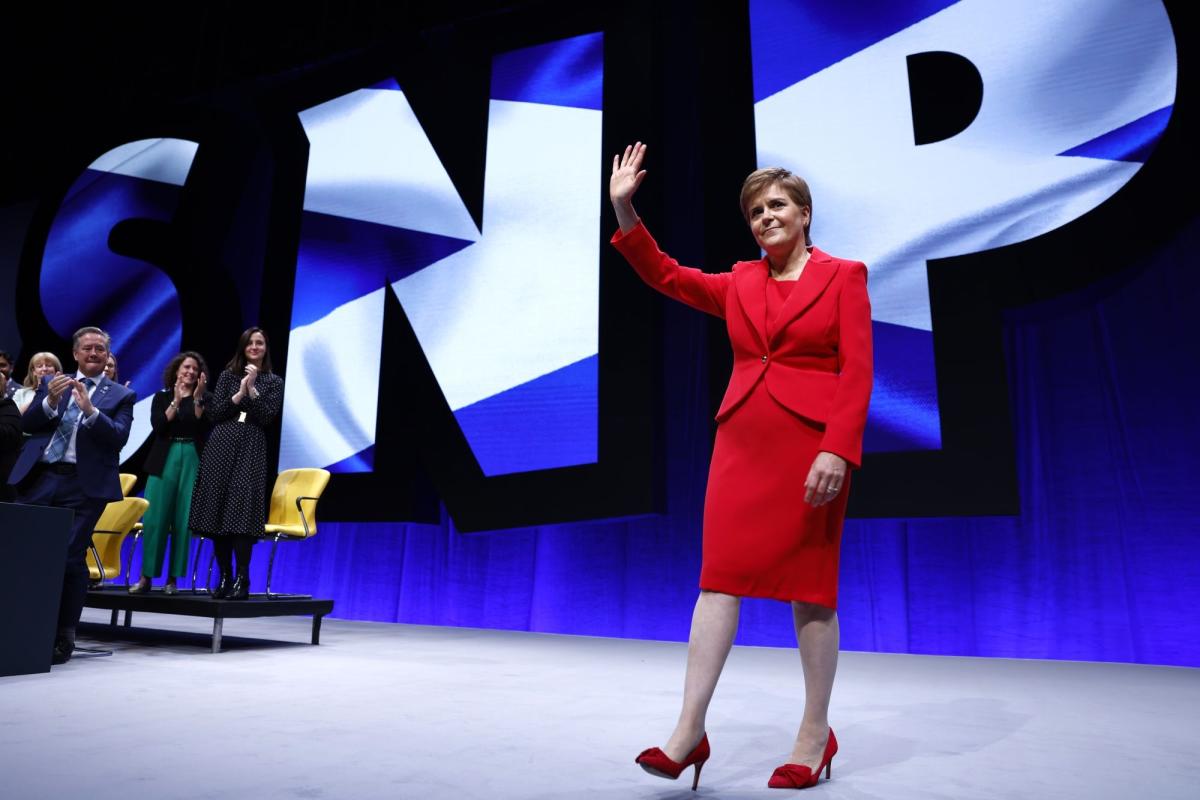
(Bloomberg) — A renewed push for Scottish independence is about to force its way onto embattled UK Prime Minister Liz Truss’s agenda.
Most Read from Bloomberg
The debate over a second referendum on Scotland breaking with the rest of the UK goes to the Supreme Court in London on Tuesday, where judges will consider a request by the semi-autonomous government in Edinburgh whether it can call a vote without Westminster’s permission.
Truss’s Conservatives, who are in opposition in Scotland, accuse the Scottish National Party government of pursuing a “self-serving, obsessive push for independence.” First Minister Nicola Sturgeon argues the move was necessary due to the UK government’s refusal to consider another vote, despite Scots repeatedly backing her SNP at the ballot box.
“If Westminster had any respect at all for Scottish democracy, this court hearing wouldn’t be necessary,” Sturgeon told delegates to the SNP’s annual conference in Aberdeen on Monday. “But Westminster has no such respect.”
The resurfacing of questions over the union — a matter that’s part of the bedrock of the Conservative Party’s makeup — is sure to heighten tensions between London and Edinburgh, while adding to Truss’s challenges as she hemorrhages voter support and comes under intense pressure from Tory lawmakers over economic and financial policy.
Regardless of the outcome of the two days of legal deliberations at the country’s highest court, the case reopens an explosive debate over the effective end of the 315-year-old UK less than a decade after voters in Scotland rejected independence in a referendum that was agreed to by then-Conservative Prime Minister David Cameron.
“This is an important moment for the Scottish independence debate which has been stuck in a holding pattern,” said Anthony Salamone, a political analyst based in Edinburgh. The case represents “a moment of change after years of stagnation on an intergovernmental dispute.”
Scottish Pressure
Truss may be on the backfoot but Sturgeon faces her own challenges. While she’s led the SNP to successive electoral victories and enjoys broad public support north of the English border, she is under pressure from activists to call the UK government’s bluff and hold a vote for independence regardless of Westminster.
Scotland’s Push to Secede From UK Won’t Go Away: QuickTake
That risks repeating Catalonia’s failed attempt to split from Spain by holding a unilateral vote that was recognized neither by Madrid nor internationally. A lawyer by training, Sturgeon’s solution is a referendum bill, announced in June, that sets out a pathway to a second Scottish vote on Oct. 19, 2023 — but she is first asking the Supreme Court for legal backing.
Dorothy Bain, the Scottish Government’s chief legal officer, referred the case to the Supreme Court because “it is a question of law which unless answered by this Court now, is unlikely to be resolved authoritatively at all,” according to legal documents.
Five judges will be presented with arguments, with a judgment expected at a later date. They will need to decide whether a “consultative referendum” relates to matters reserved to the UK government or not, as the current laws are ambiguous.
Truss, who described Sturgeon as an “attention seeker” best ignored, has vowed to refuse another vote, saying the 2014 referendum was a once-in-a-generation event. Sturgeon argues that the UK’s vote to leave the European Union in 2016 changed everything, since Scots overwhelmingly opted to stay part of the bloc.
In its arguments, the SNP says that Scotland has a right to self-determination and its strong electoral mandate makes it “democratically unthinkable” that the Scottish people should be denied a vote, according to court documents.
Political Gamble
The renewed constitutional focus is unlikely to be welcomed by Truss as the whole of the UK grapples with a cost-of-living crisis and a looming recession. Polls show the opposition Labour Party with a record lead over her Conservatives UK-wide, while in Scotland the Tories are facing collapse.
At the same time, Scotland is roughly split down the middle on independence, meaning the outcome of any referendum would be uncertain. It’s also possible that Truss would welcome an opportunity to spar with Sturgeon over the future of the union, an issue on which Conservatives can unite.
Ultimately, though, bringing the issue to the courts is a gamble. “But it’s important to remember the UK constitution is not just a legal constitution — it’s also a political one,” said Tarik Olcay, a lecturer in public law at the University of Dundee. That means the Scottish government has avenues beyond the merely legal it can pursue.
Sturgeon, for whom Truss is her fourth British prime minister after leading the Scottish government for almost eight years, has said that she’ll respect the judgment if the court doesn’t side with her. But she’s also said she would make the next general election — due in 2024 — a de-facto vote on independence.
Most Read from Bloomberg Businessweek
©2022 Bloomberg L.P.




